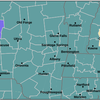Maguire, new land-bank director, says he’ll build on strengths
ALBANY COUNTY — Sean Maguire says he likes to practice what he preaches.
Currently, Maguire teaches a course in community and neighborhood development at the University of Oklahoma and emphasizes how planning shapes the physical form and design of cities and regions as he teaches at the University at Albany.
He has just been named executive director of the Albany County Land Bank, a post he’ll assume in the middle of the month as he eases out of his job as the director of Planning and Economic Development for Colonie.
“I want to expand what I do as a planner and really dig into what I teach people how to do,” Maguire told The Enterprise this week.
The land bank acquires vacant, abandoned, and tax-delinquent properties, selling them so they can be developed.
Since its founding in 2014, the county’s land bank, according to its website, has acquired 1,265 properties and sold 1,009, leveraging $11.6 million in grant funding and generating $38.1 million in private investments.
Maguire lives in Guilderland with his wife and their two children — a daughter in high school who loves music and a son in middle school who is into sports.
Maguire started his Colonie job in 2020, overseeing the administration of its comprehensive plan, site plan and subdivision review, and long-range planning efforts.
He also worked on initiatives to spur economic growth and, when The Enterprise talked to him on Monday, Maguire was in the midst of promoting a project to increase community engagement, “getting people to fix things instead of throwing them out,” he said.
Maguire grew up in a home off of Delaware Avenue in Albany. While it wasn’t red-lined, he said, his parents faced a potential threat by investing in the house.
His mother was a stay-at-home mom, he said, while his father still works the job he has long held as a carpenter at Albany Medical Center.
Maguire graduated from Albany High School with plans to become an architect. He slipped his application to attend Rensselaer Polytechnic Institute under the door on Jan. 1, the last day to apply, he said.
But he came to realize he “didn’t care about one building in particular” but rather the geography of a city.
Maguire had this awakening when he took two introductory courses at the University at Albany — one on urban planning and the other on urban geography.
He recalls taking pictures — with an actual camera and film that had to be developed — and then bringing those pictures of streetscapes to class to be discussed.
Maguire uses the phrase “eyes on the street,” a term coined by Jane Jacobs who wrote the bible of urban planning, “The Death and Life of Great American Cities,” and organized a grassroots movement to protect her beloved Greenwich Village from urban renewal and the likes of Robert Moses.
“It’s the easiest ‘A’ I ever had,” said Maguire since understanding what makes a city and how its residents interact came naturally to him.
“GIS was just taking off then,” he said of geographic information systems, “and satisfied my need to work on computers.”
He graduated from the University of Albany with a bachelor’s degree in geography and urban studies and went on to earn a master’s degree there in regional planning and later earned a second master’s degree in public administration.
His internship as a graduate student with the Capital District Regional Planning Commission led to a job as a planner for River Street Planning & Development. He went on to work as the Senior Economic Development Planner for Albany County and then worked for seven years as a local government specialist for the state’s Department of State.
After a four-year stint as Director of Economic Development for the Capital District Regional Planning Commission, Maguire moved on to his current job in Colonie.
He’ll be replacing Adam Zarenko at the land bank; Zarenko now works in the governor’s office. Maguire plans to catch up with Zarenko after the hectic negotiations on the state budget are over.
He said he’ll spend the first 30 days in his new post as an active listener, the importance of which he stresses in the courses he teaches.
“Sometimes people look at what they have to fix,” said Maguire. His approach is different, he said; it comes “from a sense of strength and knowledge of assets.”
His approach, Maguire said, is to “leverage what a community has, not just fix its problems.”
He concluded, ‘It’s a lot easier to build on strength.”



